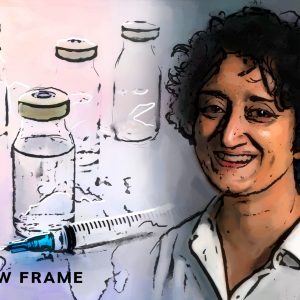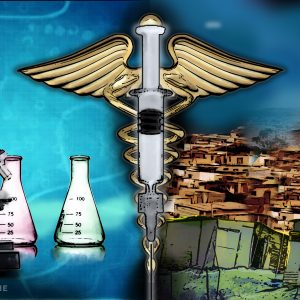Getting migrants vaccinated is critical
Migrants without documents may be justifiably hesitant to get the Covid-19 vaccine and need assurance that their information will be protected and not used against them.
Author:
8 February 2021

The arrival of the first batch of Covid-19 vaccines has brought with it a renewed sense of hope in the fight against the coronavirus. But after nearly a year in lockdown and with the South African government bungling its initial responses to fight the virus, there is some scepticism about the rollout as well.
Speaking after the arrival of the vaccine in South Africa, President Cyril Ramaphosa went for hope and optimism. “The arrival of these vaccines contains the promise that we can turn the tide on this disease that has caused so much devastation and hardship in our country and across the world,” he said. “The speed and scale at which new vaccines have been developed is unprecedented in human history and represents the monumental progress that humanity can achieve in the face of a common threat.”
However, just a few weeks ago, there were doubts about the rollout of vaccines to countries in the Global South as richer, Western countries were reportedly hoarding more vaccines than they needed.
Related article:
During a virtual address to the World Economic Forum in January, Ramaphosa warned about the dangers of vaccine nationalism in the fight against the Covid-19 pandemic.
“We are deeply concerned about the problem of vaccine nationalism, which, unless addressed, will endanger the recovery of all countries,” he said. “Ending the pandemic worldwide will require greater collaboration on the rollout of vaccines, ensuring that no country is left behind in this effort.”
The hope and optimism that came with the arrival of the vaccine was short lived. During a press conference on 7 February, health minister Zweli Mkhize announced that the vaccine rollout was temporarily halted following the initial disappointing results of a study into the effectiveness of the AstraZeneca vaccine against the B.1.351 variant of Covid-19.
The government will instead over the coming weeks offer vaccines produced by Pfizer and Johnson & Johnson.
Related article:
But while South Africa had to adjust its vaccine rollout strategy, migrant organisations and researchers warned about the dangers of a different kind of vaccine nationalism. Despite the government saying that migrants, refugees, asylum seekers and even undocumented people will qualify for the vaccine, some irresponsible reporting has been more ambiguous about it.
The United Nations High Commissioner for Refugees has reiterated the importance of countries around the world to include these vulnerable groups in their vaccine strategies, and Jordan has led the way by vaccinating refugees.
Ramaphosa insisted that the vaccine would be made available to all adults living in South Africa “regardless of their citizenship or residence status”.
“We will be putting in place measures to deal with the challenge of undocumented migrants so that, as with all other people, we can properly record and track their vaccination history,” he said. “It is in the best interests of all that as many of us receive the vaccine as possible.”
Into the fold
Despite these reassurances, Amir Sheikh, spokesperson for the African Diaspora Forum, said more still needed to be done to encourage migrants to come forward and get vaccinated, especially those with expired permits or without documents.
“The government has been speaking in different voices when, in fact, the message from them was supposed to be in one voice. That is a worrying factor, but we welcome the reassurances by the president that no one will be discriminated [against], especially migrants, irrespective of their status, whether they are documented or not documented,” he said.
Related article:
“We also welcome the reassurance of the president that contradicts the previous nationalism of the vaccine from [Minister of Health] Zweli Mkhize.”
Sheikh was referring to comments Mkhize made during an SABC interview in which he was asked who would qualify for the vaccine. A subsequent article headline on the broadcaster’s website misleadingly stated, “Only South African citizens to receive vaccine: Mkhize”.
Mkhize’s actual words were: “All you need when you go is to show that you have got an ID. You are a South African registered voter. For those who are undocumented, we are not able to deal with that because at the moment we would like to be able to deal with people based on the SA registration [database]. So at this point, we have no plan to deal with those that are not documented.”
Another form of nationalism
Sally Gandar, head of advocacy and a legal adviser at the Scalabrini Centre in Cape Town, said it would be hypocritical of the government to limit the vaccine rollout inside South Africa’s borders to only those who hold citizenship or valid documentation. She said that excluding people based on citizenship or their documentation status was just another form of vaccine nationalism.
“This is why [Ramaphosa’s] assurances that undocumented persons will be provided with the vaccine, assurances that are so public and unequivocal, in his 1 February address are important and a solid show of leadership. The next step is the same publicity around the ‘how’ – ensuring that systems and safeguards are put in place to ensure smooth and equitable access to vaccines as a public good, systems and safeguards that address other fears that undocumented persons may have.”
The Scalabrini Centre had to approach the courts last year to ensure that asylum seekers with valid permits as well as citizens from Zimbabwe, Lesotho and Angola who held valid exemption and special permits could apply for the Covid-19 relief grant.
Related article:
Sheikh said besides possible institutional barriers such as this and medical xenophobia, many undocumented migrants would be hesitant to come forward to be vaccinated for fear of being arrested and deported.
“Realistically speaking, many of our undocumented migrants will not even seek the vaccine. If they are not going to be forced, they will not go out and actually look for the vaccine for fear that it might actually be a trap and for fear that they will be arrested. That’s the reality. But we like that for the first time, South Africa, in accordance with its Constitution, will not be sidelining migrants. But rest assured, many of our undocumented will not go and seek the vaccine.”
Protecting information
Jo Vearey, director of the African Centre for Migration and Society at the University of the Witwatersrand, said one of the key issues linked to confidentiality, anonymity and the protection of people was to ensure that regardless of someone’s legal status when they come for the vaccine, this information is not fed to the Department of Home Affairs or the South African Police Service.
“I’m thinking that we may need to return to the oversight role and the legal reviews that took place when the initial test and trace processes were rolled out earlier last year, with the ways that there were guarantees of data protection and ensuring that data was only linked to the traces processes … I am thinking we will need something similar.”
Vearey said the blanket extension of asylum-seeking permits would need to be clearly communicated and everybody involved with the delivery of vaccinations should be made aware of that.
Related article:
“We need to ensure that everyone in the country, and in fact everyone in the region, is vaccinated as quickly as possible. We know that, for example, migrant worker hostels were mentioned by the president as a key target area. So high-density areas need to be included as soon as possible.
“We need to vaccinate as many people as quickly as possible. Excluding anyone is to the detriment of all of us, and if we don’t ensure as high coverage as quickly as possible then the vaccine won’t actually do what we need it to do in terms of population immunity.”
Gandar agreed and said it was critical to have a proper communication strategy for the vaccine to ensure individuals that it is safe to use, that everyone has the right to get it, and that none of the information one provides when accessing the vaccine will be passed on to law enforcement or home affairs.





